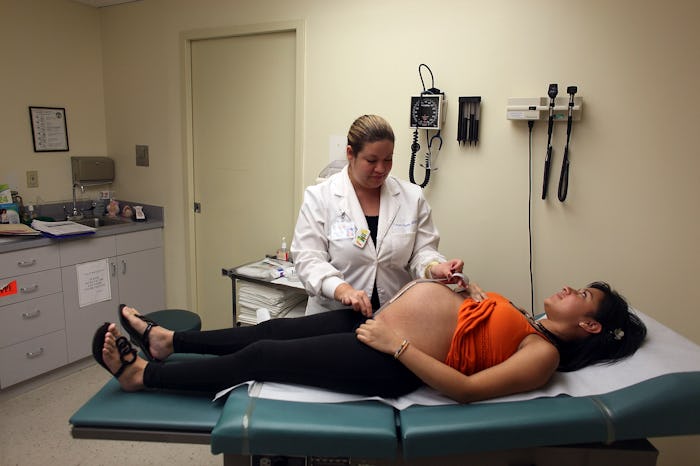News

There's An OB-GYN Problem In The US
There is nothing more topical in the nation right now than health care, as politicians are threatening to repeal Obamacare and replace it with what could definitely be considered system. Amidst the debates going on over how health care reform should look, an entirely independent thing is threatening to hurt women's health care and their access to it. A new study has found that the United States is at a risk of an OB-GYN shortage, which could mean bad news for women. Because just when we thought our access to health care could not get any worse, this happens.
New research, conducted by Doximity, a social networking website for doctors, found that women's health is at an impending crisis due to a potential shortage of OB-GYN doctors. Here's what they found: the average age of OB-GYNs is 51 years old and the average retirement age of those same doctors is 59. Only 14 percent of all OB-GYNs are 40 or younger (and even fewer are wanting to enter the practice). With more babies being born and more doctors retiring, this could be a cause for a disaster down the line.
The metropolitan cities that are the most threatened by this potential shortage? Las Vegas, Nevada; Orlando, Florida; and Los Angeles, California — all of which can't afford to lose these doctors.
"The current workforce in obstetrics and gynecology is aging, retiring early, and going part time at an increasing pace, while the number of patients seeking care is exploding due to health care reform and population statistics," Dr. Valerie Jones, a retired OB-GYN and member of Doximity's Medical Advisory Board, said in a press release for the study. "Access to maternity care and women's health services is vitally important, and we need to have infrastructure to support these numbers or these women will have no OB-GYN to turn to, despite having insurance."
These retiring doctors aren't being replaced fast enough, either, due to a lack of interest. According to Yahoo News, OB-GYNs have the second highest burnout rate next to emergency room doctors. Medical students are reluctant to even become OB-GYNs. According to Yahoo News, they believe the workloads are too heavy and the hours are physically demanding (especially when a woman goes into labor at 2 a.m.). On top of all of this, OB-GYNs are more likely to be sued by patients compared to other doctors and when it comes to compensation, they don't make the most money, either. All of these elements don't make entering obstetrics too appealing for some.
But there are so many benefits to being an OB-GYN. OB-GYNs do it all; they deliver babies, they screen for cancer, they take care of women from the time they start menstruating through menopause. The services that OB-GYNs specifically provide are vital.
If you thought it was impossible to get an appointment with your current doctor, imagine how much longer it will be with a shortage. As previously stated, women's health care is at risk with the current health care reform and repeal. Planned Parenthood could be defunded for one whole year (giving women even less access to health care) and insurance premiums could rise (making going to the doctor much more expensive. An increased demand for these doctors with an increased cost won't make going to the OB-GYN any easier and won't make becoming an OB-GYN any more appealing.
According to a report from the American Congress of Obstetricians and Gynecologists from 2016, there are around 20,000 OB-GYNs practicing in the United States. With the current projected shortage rates, there could be 6,000 to 8,000 fewer OB-GYNs by 2020. Without these doctors to deliver babies and take care of women, women's health could be in serious jeopardy in the near future.